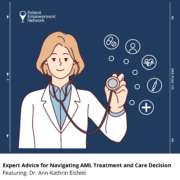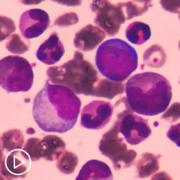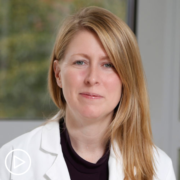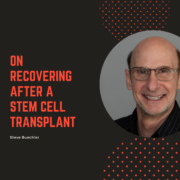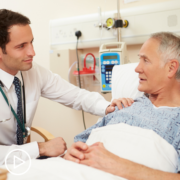AML Treatment Side Effects: What’s Fact and What’s Fiction?
AML expert, Dr. Jessica Altman, addresses AML treatment side effects, such as nausea and changes in taste, in addition to discussing best practices for researching AML online.
Dr. Jessica Altman is Director of the Acute Leukemia Program at Robert H. Lurie Comprehensive Cancer Center of Northwestern University. More about Dr. Altman here.
See More From The Fact or Fiction? AML Series
Related Resources
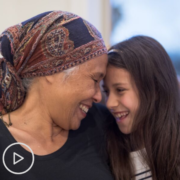
|

|

|
Transcript:
Patricia:
All right, a little more fact and fiction now. Here’s what we hear from AML patients about treatment side effects. Tell me if this is true or not. “Treatment side effects are unavoidable.”
Dr. Altman:
I think it’s probably true, but I don’t think it’s completely true. So, I think they’re a long ways away from being in that Hollywood picture of someone with cancer vomiting over the toilet. We have very good anti-nausea therapy that we give as preventative treatment, and we give the anti-nausea therapy different antiemetics based on the emetogenicity, or the risk of nausea related to chemotherapy.
And we know that. We know how risky an individual and a specific chemotherapy regimen is. In addition, there are additional anti-nausea medications available for all of our patients should they have nausea above and beyond what the preventative medications can handle. So, that’s one that I think, that nausea doesn’t have to occur and we can treat nausea. Many patients with Acute Myeloid Leukemia, with treatment, will experience fever that is related to the low blood counts and related to the chemotherapy itself. That being said, we give preventative antimicrobial therapy to prevent infection as one of the potential causes of fever.
Patricia:
Is there an increased risk of sunburn and skin cancer with AML?
Dr. Altman:
So, some chemotherapies increase the risk of sun exposure and damage and sunburns. IN addition, some of the preventative antimicrobial medication that we use also can cause some skin sensitivity. There is a risk, whenever we give chemotherapy, of an increased chance in the future of secondary cancers. The risk of that is very low, but that is a risk that I talk about with all of my patients. Skin cancer is one of the cancers. There also is potential increased risk of thyroid cancer, increased risk of other bone marrow damage. And so, that is part of the conversation that I have with my patients.
Patricia:
The internet is a wonderful place, Dr. Altman, but for AML patients or anyone looking up medical information it can be overwhelming and infinite.
And confusing. What are some of the things that AML patients should think about when they’re researching their cancer on the internet?
Dr. Altman:
So, I think the most important thing is to have a conversation with their healthcare practitioners and ask their healthcare practitioners what resources they recommend. And I think being upfront and telling your doctors that you’re utilizing the internet is always welcome by the healthcare provider. So, I think that utilization of the internet is fine, but just making sure that you ask your healthcare provider what resources he or she recommends.
Patricia:
Right, right. We have a question from Mari. She says, “I had busulfan treatment for my AML with great success. Experienced a side effect of noticeably patchy and thinning hair.”
“Is there hope for finding a cure for this chemo-induced alopecia? Life and self esteem is a huge role in survivorship. It can’t simply be fixed or covered with a wig.”
Dr. Altman:
Thank you, Mari. I appreciate that question. We at Northwestern have a Dermato-Oncology program that we work with. So, we have dermatologists who are very interested in the immediate and long-term side effects of chemotherapy and the skin manifestations of cancer, including blood cancers. So, my recommendation would be to try to seek out a dermatologist in conjunction with your oncologist to help see if there are other options that exist.
Patricia:
We also had a question from John. He wants to know if there’s a way to combat serious changes in taste and appetite from chemo.
Dr. Altman:
So, I smirk a little bit because I keep waiting for the food scientist or food engineer to approach me about this.
The biggest day-to-day complaint that we get from our patients is that the food tastes bad. And we know that while the hospital food might not be the greatest, it’s not just the hospital food. It’s the effect of the chemotherapy on taste buds. I don’t yet have an answer for this, but I’m very interested in finding a food scientist who can develop food that tastes normally for patients who are undergoing chemotherapy.
What I suggest to my patients during the time period that they’re having chemotherapy is to try foods that maybe they don’t normally eat so that they don’t recognize how different it tastes from what they’re used to. And things that are a bit more bland for patients taste a little bit better, and colder foods don’t induce as much nausea for most of our patients. But another great question that I don’t have the answer to yet.
Patricia:
I know we talked a little bit about how overwhelming the internet can be, and how confusing a lot of the information is. How can patients identify misinformation and unreliable sources if they don’t have a conversation with their doctor in the wing?
Dr. Altman:
So, I think that as you mentioned, anything on the internet is not a substitute for medical advice. I think the same pearls that I would give to anyone who’s searching anything on the internet – anything that says ‘always’ or ‘never’ is probably not to be trusted, and anything that sounds too good to be true may well be too good to be true. I would start with reputable sources. The partners that you mentioned – the Leukemia and Lymphoma Society and the Aplastic Anemia and MDS Foundation have really good websites with patient information.
And the emerging growth of this organization as well, we anticipate growth of information available to our patients.


